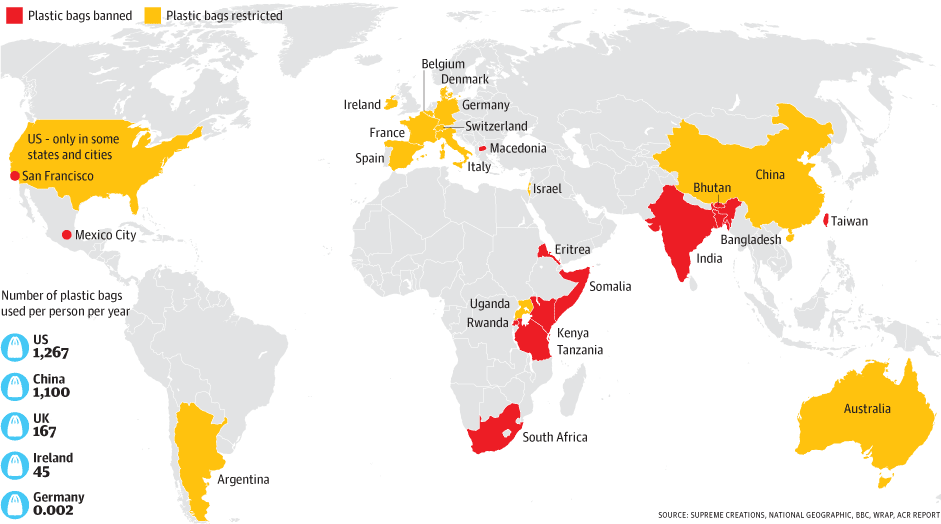In my previous post, I proposed that the United States tax
plastic bags.
Such a tax has been extremely successful in Ireland.
Currently, the tax is set at thirty-cents (in US dollars) per bag. All of the money procured from the tax
goes directly to the environmental ministry for enforcement and clean-up
projects. Shopkeepers initially thought consumers would not accept it, fearing
for the well being of their businesses.
At this point however, ten years after the tax was
introduced, the tax is no longer really about the money. It has become
“socially unacceptable” to carry plastic bags, addressing a “very bad habit”
that people can easily change by investing in reusable bags. People are
actually enthusiastic about it and proud of what Ireland has done to eradicate
plastic bags. (http://www.nytimes.com/2008/01/31/world/europe/31iht-bags.4.9650382.html?pagewanted=all&_r=0)
Since it was introduced ten years ago, the tax has generated
166 million euro for Ireland. (http://www.irishexaminer.com/ireland/plastic-bag-levy-nets-166m-in-10-years-185605.html)
Individual US cities have taken similar measures to ban
plastic bags. Washington DC now charges five cents for every disposable grocery
bag. (http://content.usatoday.com/communities/greenhouse/post/2010/10/us-cities-ban-plastic-bags/1#.UH4AhI4ZdSo)
During its first year in effect, DC collected an additional $2 million in tax
revenue. (http://www.huffingtonpost.com/2011/12/01/plastic-bag-bans-fees_n_1123439.html)
Imagine having such an effect on a national level. If one of America’s cities
generated that much additional revenue, how much would expanding the tax to ten
other big cities generate?
Seattle made the switch, banning plastic shopping bags entirely rather than taxing them. Paper bags, however, are taxed, addressing another environmental concern. Paper bags are often viewed as a more eco-friendly alternative to plastic when in reality, they are just as bad for the environment with the amount of water and the number of trees used to produce them.
Photo credit: http://westseattleblog.com/blog/wp-content/uploads/2012/06/bagbanflyer.jpg
One alternative proposed by plastic manufacturer retailers
is to promote recycling of the bags by installing recycling centers in stores.
(http://content.usatoday.com/communities/greenhouse/post/2010/10/us-cities-ban-plastic-bags/1#.UH4AhI4ZdSo)
In all seriousness, how many of us actually recycle our
plastic bags?
My hometown transfer station recycles every type of plastic…except
bags.
The switch is not a hard one. But most will only do it if
forced to with a tax. Hey, in my opinion, it’s not money out my pocket. I
already made the switch.
I approve my tax dollars to do that: tax plastic bags.


No comments:
Post a Comment